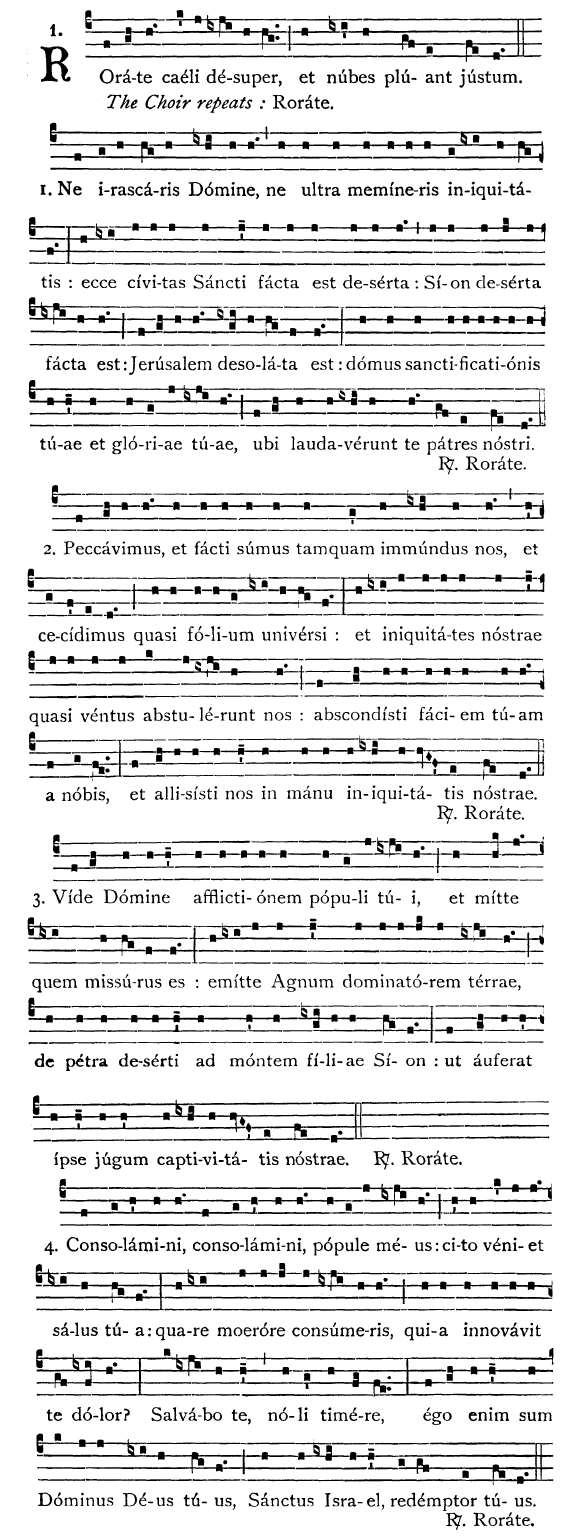Today's Festival Eucharist for Christ the King at St. Thomas Fifth Avenue was superb; I highly recommend listening. The music was magnificent, and a kind of compendium across the centuries of all kinds of "Christ the King"-ly music. Although in my opinion
Coronation is certainly not the right tune for the opening hymn, "All hail the power of Jesus' name"; that would course be
Diadem:
Sometimes the Methodists - and the Lutherans and the Mennonites - just have a better idea when it comes to hymns.
In any case, the choir sang, as the Offertory, James MacMillan's polyphonic setting of the introit/acclamation/chant
Christus Vincit. Here's a video of this really gorgeous piece:
And here's a very nice video of the plainchant version, labeled "Medieval Gregorian Chant,"
from Corpus Christi Watershed. Below that is an image of the first page of the chant itself, from the (RCC) Parish Book of Chant (see it in
this PDF starting on page 103):
This piece is, apparently, intended to be sung "In Honor of Christ the King" in the Roman Catholic Church. (I'm not sure whether that means it should be sung on the Feast Day or not - but it is, apparently, used that way at least occasionally.) Anglicans sometimes sing one of the various settings of
Christus Vincit at Easter - but of course, if singing this plainchant version we'd (most of us, anyway!) excise the section of the plainchant dedicated to the Pope.
EWTN titles the "Christus Vincit" text as "Acclamations VIII Cent., Ambrosian Chant (Variant)." It seems to have been used at various coronations - both secular and religious (i.e., the crowning of the Pope) - throughout European history (see
this page for more about all that). New Advent has a bit about the chant,
here, in a section called "Growth of liturgical acclamations" - and introduced by this sentence: "It seems highly probable that the practices observed in the election of the Pagan emperors were the prototype of most of the liturgical acclamations now known to us."
Almost contemporary with [the above acclamations] are the acclamations found in our English Egbert Pontifical (probably compiled before 769) which with other English manuscripts has preserved to us the earliest detailed account of a coronation in the West. The text is a little uncertain, but probably should read as follows:
Then let the whole people say three times along with the bishops and the priests; 'May our King, N., live for ever' (Vivat Rex N. in sempiternum). And he shall be confirmed upon the throne of the kingdom with the blessing of all the people while the great Lords kiss him, saying: 'For ever. Amen, amen, amen.'
There is also in the Egbertine ritual a sort of litany closely resembling the imperial acclamations just referred to, and this may be compared with the elaborate set of laudes, technically so called, which belong to the time of Charlemagne and have been printed by Duchesne in his edition of the Liber Pontificalis, II, 37. In these imperial laudes the words Christus vincit, Christus regnat, Christus imperat (Christ conquers, Christ reigns, Christ commands), nearly always find a place. It should be added that these acclamations or some similar feature have been retained to this day in the Eastern coronation rituals and in a few of Western origin, amongst others in that of England. Thus for the coronation of King Edward VII in 1902 the official ceremonial gave the following direction:
When the Homage is ended, the drums beat and the trumpets sound, and all the people shout, crying out: 'God save King Edward!' 'Long live King Edward!' 'May the King live for ever!'
Anglicans do not, in fact, officially celebrate Christ the King in the first place; for us, it's simply the Last Sunday after Pentecost. (Stephen Gerth of St. Mary the Virgin in New York
explains the historical tradition of celebrating Christ as King at Epiphany; he says that "In origin, [the feast day of] Christ the King wasn’t about Christ; it was about the pope." There's more about that at the link; the holiday initially was set, in 1925, for the last Sunday in October, and the pope's encyclical stated that it was specifically in order to fight "anti-clericalism." I agree with Fr. Gerth that the compilers of the 1979 BCP did a really good thing by ignoring the origin of the Feast and moving the celebration of the Kingship of Christ to the last day of the Church Year - and without actually celebrating it as feast day. Nicely done indeed! It's a great day, I think - and I do like that Anglicans take the focus off the earthly "rulers," and put it entirely on Christ alone.) The current US BCP collect on this day is one that definitely focuses on the Christ the King theme:
Almighty and everlasting God, whose will it is to restore all things in your well-beloved Son, the King of kings and Lord of lords: Mercifully grant that the peoples of the earth, divided and enslaved by sin, may be freed and brought together under his most gracious rule; who lives and reigns with you and the Holy Spirit, one God, now and for ever. Amen.
Hatchett's Commentary has this about the collect:
This is a somewhat free translation by Capt. Howard E. Galley of the collect of the Feast of Christ the King in the Roman Missal. Christ is portrayed as the king who frees those who are bound and unites under His gracious rule all who are divided.
Not sure at all who "Capt. Howard E. Galley" is, though! The original collect for this day - this one's from
the 1549 BCP - is the "Stir up" collect now used, in amended form, on Advent 3:
Stir up, we beseech thee, O Lord, the wills of thy faithful people, that they, plenteously bringing forth the fruit of good works, may of thee be plenteously rewarded; through Jesus Christ our Lord. Amen.)
The St. Thomas Choir also sings a lovely setting of
Dignus Est Agnus, the Introit for the day (
I posted on that this past week), by Malcolm Williamson. That one's not on YouTube, so go have a listen to the service to hear it. You'll be quite happy, I predict, with Thomas Attwood's Anglican Chant setting of Psalm 100, too; it's the same tune as
this one, used for Psalm 50.
And then of course, you really can't beat "Crown him with many crowns" to end the day - some of the very best lyric anywhere. This video comes from Queen Elizabeth II's 50th Jubilee, and it's moving to think about her, a "crowned head" herself, having made this choice: "Crown Him the Lord of Lords, Who over all doth reign."
You can find
all nine verses here, but we sing only these four:
Crown Him With Many Crowns
Crown Him with many crowns,
The Lamb upon His throne;
Hark! How the heavenly anthem drowns
All music but its own!
Awake, my soul and sing
Of Him who died for thee,
And hail Him as thy matchless King
Through all eternity.
Crown Him the Lord of life,
Who triumphed o’er the grave,
And rose victorious through the strife
For those He came to save.
His glories now we sing,
Who died and rose on high,
Who died eternal life to bring
And lives that death may die.
Crown Him the Lord of Lords,
Who over all doth reign,
Who once on earth, the incarnate Word
For ransomed sinners slain
Now lives in realms of light
Where saints with angels sing
Their songs before Him day and night,
Their God, Redeemer, King.
Crown Him the Lord of heaven,
Enthroned in worlds above;
Crown Him the King to whom is given
The wondrous name of Love.
Crown Him with many crowns
As thrones before Him fall;
Crown Him, ye kings, with many crowns
For He is King of all.
I do adore the music and textual themes on this day. Yes, I do.














